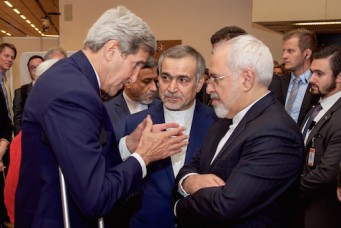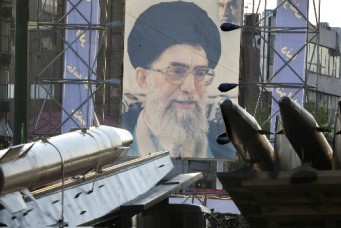A Wiser U.S. Policy for Iran?
As U.S.-Iranian tensions rise, the Trump administration should adopt a political-military strategy that will counter the causes and effects of Iranian aggression.

People rally in support of Iranian anti-government protests in Los Angeles, California, U.S. January 7, 2018. Monica Almeida/Reuters
The apparent dissipation of the protests in Iran, which were generally limited to the country’s smaller cities and towns and focused on the economic grievances of the lower classes, indicates that the United States will likely have to continue to contend with its adversarial government for quite some time. Therefore the Trump administration should devise a strategy that incorporates mutually complementary military and diplomatic elements designed to deter Iranian aggression while persuading the Iranian government that the United States is willing to compromise with it on reasonable terms.
First, the United States should wait to revise the Iran nuclear agreement rather than attempt to arm-twist the international community into re-imposing sanctions prematurely.
Some American policymakers argue that private industry lobbies with growing stakes in Iranian markets could complicate negotiations on extensions of critical provisions of the Iran deal that will become necessary within roughly eight years.
In combination with constructive diplomatic engagement, however, private business interests could also be moderating influences on Iran insofar as they engage with their Iranian counterparts on the basis of mutual respect and in pursuit of mutual benefit.
Cultivation of these relationships could help build rapport in favor of more effective negotiations on pressing regional issues. Within an eight-year time frame, they could also improve the chances of achieving an extension of vital terms of the JCPOA.
Some proponents of the theory that Iranian hardliners need to maintain the U.S. as an enemy to justify their maintenance of power seem to have crafted it to channel U.S. policymakers toward a policy of regime change. Whether the theory is rooted in a fixed objective reality remains a matter for debate.
It is at least as plausible that U.S. actions against Iran over the course of decades—some necessary and justified by Iran’s hostile policies—have generated and reinforced Iranian threat perceptions to the point that many of Iran’s leaders genuinely do believe the United States is an implacable enemy. This is not a universal or unchangeable belief among Iranian policymakers, however.
Even if it is firmly encoded in the mind of the Supreme Leader of Iran, Ayatollah Ali Khamenei, he, at 78 years of age (and reportedly having been treated for cancer) may soon follow his revolutionary companion, former president Akbar Hashemi Rafsanjani, who passed away at 82.
Khamenei’s as-yet unknown successor, who will have his own unique experiences and nuanced perspectives, could prove more amenable to new, unforeseeable diplomatic opportunities.
However pessimistic one might be regarding the prospects of this, it cannot be dismissed. Iranian leaders’ perceptions of the U.S. should in any case be challenged through reasonable U.S. policy compromises and offers of cooperation in areas of mutual interest such as climate security.
Although the Islamic Republic of Iran’s ideology certainly should not be ignored, it is arguably more important to recognize the psychology behind it. Most advocates of confrontation with the Iranian government failed to demonstrate any comprehension of the historical trauma that generated and will continue to sustain it unless it is gradually neutralized through poised, transformational diplomacy.
Policymakers such as Senator Tom Cotton (R-Arkansas), who is rumored to be under consideration to succeed Mike Pompeo as CIA Director, have argued that the United States has military options on Iran short of invasion and occupation but also admitted that if the United States bombed Iran’s nuclear facilities, Iran could escalate. They say little about how Russia or China would likely respond if the U.S. became engaged in a military conflict with Iran.
Considered within the broader context of Russia’s resurgent geopolitical ambitions and threat perceptions of the United States, which would dramatically increase if the United States initiated a war with Iran, it is highly plausible that Russia especially might view a U.S.-Iran conflict as a covert opportunity to further strain a U.S. economy that is already $20 trillion in debt.
North Korea, one might add, is a far more imminent and threatening national security priority. Having to fight two major conflicts simultaneously (not including existing U.S. military commitments in Iraq and Afghanistan and elsewhere throughout the region, which would likely resurge in the event of a conflict with Iran) would place great strain on American military and financial resources.
War certainly would become necessary if Iran attempted to cross the red line of imminent nuclear weapons acquisition. As long as critical provisions of the nuclear agreement remain in force over the next roughly eight years, however, the JCPOA should preserve high confidence that the United States and its allies will be able to maintain sufficient early warning time to continue exploring longer term diplomatic solutions.
The Trump administration should therefore focus on devising a bolder, more constructive diplomatic element of a U.S.-Iran strategy, taking advantage of the time the JCPOA provides it.
Hardline religious nationalist elements in Iran, the United States, and Israel will undoubtedly make the conditions for an alleviation of hostilities very difficult to achieve, considering their tendencies to view the world in terms of good versus evil devoid of historical and psychological context. Perhaps once the citizens of each country finally tire of the bloodshed and self-righteous moral absolutism perpetuating it, more pragmatic diplomatic influences will prevail and the world will turn to more constructive pursuits such as our collective climate security.
The wisest regime change policy the United States could pursue—while it has the time—would be one that seeks a gradual evolution of the Islamic Republic of Iran by attempting to reduce threat perceptions and focus on common values and interests. Iranian protesters may resurge but the United States cannot count on them to effect a revolution and any effort by the Trump administration to support them is more likely to delegitimize than increase their chances of success.
Thomas Buonomo is the Humanist Studies Coordinator for the American Humanist Association. His views do not represent an official position of AHA. On Twitter: @ThomasBuonomo




